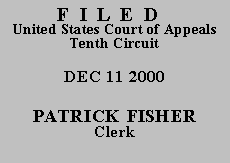

| JEFFREY A. COLLIER,
Plaintiff-Appellant, Defendant-Appellee. |
No. 00-3137
(D.C. No. 00-CV-3044-GTV) (Kansas) |
In Sandin v. Conner, 515 U.S. 472 (1995), the Supreme Court concluded that because prison discipline "falls within the expected perimeters of the sentence imposed by a court of law," id. at 485, disciplinary placement in segregated confinement does not itself necessarily implicate constitutional liberty interests. Id. at 486. Instead, the Court held that such placement only gives rise to a liberty interest protected by the Due Process Clause when it "imposes atypical and significant hardship on the inmate in relation to the ordinary incidents of prison life." Id. at 484. In determining that the confinement at issue in that case did not meet this standard,
the Court carefully examined the specific conditions of the prisoner's confinement. The Court determined that the prisoner's conditions essentially "mirrored those conditions imposed upon inmates in administrative segregation and protective custody," so the prisoner's "confinement did not exceed similar, but totally discretionary, confinement in either duration or degree of restriction."
Perkins v. Kansas Dept. of Corrections, 165 F.3d 803, 808-09 (10th Cir. 1999) (quoting Sandin, 515 U.S. at 486).
Mr. Collier has alleged no facts showing that his confinement in administrative segregation presented the type of atypical, significant deprivation that would implicate a liberty interest. Because he therefore has no constitutionally protected interest in avoiding that confinement, he has no constitutional cognizable claim to guidelines regulating it.
We AFFIRM the judgment of the district court.(2)
ENTERED FOR THE COURT
Stephanie K. Seymour
Chief Judge
*.After examining appellant's brief and the appellate record, this panel has determined unanimously that oral argument would not materially assist the determination of this appeal. See Fed. R. App. P. 34(a)(2) and 10th Cir. R. 34.1(G). The case is therefore submitted without oral argument. This order and judgment is not binding precedent, except under the doctrines of law of the case, res judicata, or collateral estoppel. The court generally disfavors the citation of orders and judgments; nevertheless, an order and judgment may be cited under the terms and conditions of 10th Cir. R. 36.3.
1.Mr. Collier's request for appointment of counsel is denied.
2.Mr. Collier is reminded that he must continue making payments on the fee for his appeal until the entire fee has been paid.